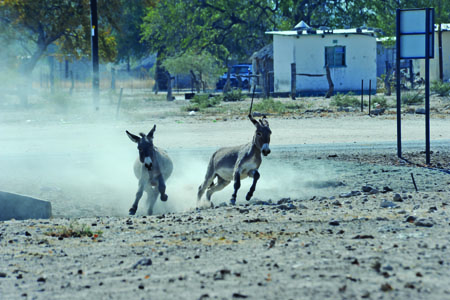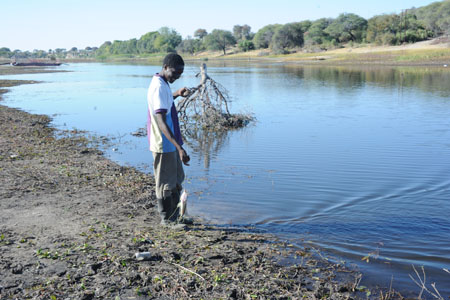Life along the Boteti River banks
Source : Kutlwano
Author : Baleseng Batlotleng
Location : Letlhakane
Event : Feature Article
Life along the Boteti River banks
……A mixture of joy and anger!
Article: Baleseng Batlotleng
Photo: Phenyo Moalosi
Curious onlookers, almost all of them as young as 20 years and below gather to the Boteti River bank just a sniffing distance from the Motopi Kgotla. To them the word majestic is a perfect sketch of a scene they haven`t laid their eyes on since they birth. The first and most lasting impression that makes them more prying is the memorable view of the river stretching further into the horizon and offering them unimaginable beauty.
To those who grew up here along the banks of the river the flow is a blessing in disguise. From its almost two decades of deep slumber the river has left a trail of anger and jubilation.
Word has it that on a good season the river is plenty capable of frustrating those who travel to the other side of the village for a cup or two of the mogwana brewed khadi traditional beer. Their journey back home becomes emotionally taxing as they cannot take a chance of swimming across the river.
To the farmers, crocodiles feast on their innocent flock and hippopotamus also pose danger to unsuspecting villagers who rely on a good haul of fish and tswii for sustenance. Notwithstanding that, the river has been a source of life for many over the centuries.
The formation of the river was a result of the drying up of the waters from the Okavango basin. Changing climatic conditions and tectonic activities in the Okavango Delta region over a thousand of years completely changes the face of the Makgadikgadi Lake.
This resulted in the formation of the Boteti River amongst a plethora of cultural and natural resources signifying the once glorious life that the ancient lake provided. Right now the Boteti River draws its drops from the Okavango wetlands via the Thamalakane River and enters Boteti which brings it down from Makalamabedi all the way down to Kedia.
History shows that there was high flow out of the Okavango from 1955 to 1958 and from 1975 to 1981. Disappointing inflows were recorded between 1933 and 1950 then again from 1968 to 1986. This was when the Boteti River dried up.
Goitseone Leburu a resident of the peaceful village of Moreomaoto just a stone throw away from the main road is worried that without a good inflow the situation in Boteti might go back to the days when the river dried up. Her only source of income is through basket weaving which she sells to tourists who visit the area. Further she is excited that in no time, a plant known as tswii – a potato-like edible plant will be in abundance in the river for the villagers to harvest.
The Boteti River inches past Khumaga, a sleepy village which many in Boteti consider as the gateway to the Makgadikgadi and Nxai Pans National Park, the same route that takes visitors to the tourist attractions of Phuduhudu and Makolwane.
The pans are stark, flat featureless terrain stretches which seems to eternity, meeting and fusing with a milky blue horizon. For much of the year most of this desolate area remain waterless and extremely arid but during a good rainy season the pans flood attracting animals on the grassy plains offering a grand spectacle.
In Khumaga visitors are taken across the other side of the village by a privately owned ferry boat. Daily life for women folk is also a common sight. Boikobo and Elna Mantshonyane take advantage of the hard to crack clay soil from the river and construct clay bricks for sale. Fishing is also part of the daily chores for both young men and old folks in the village.
From Khumaga the river coils past the famous village of Tsienyane (present day Rakops). The village provides the link between the Central Kalahari Game Reserve (CKGR) and Boteti region. Life appears to be normal for livestock in the villages of Toromoja and Mmadikola where the river has become accustomed to drying. The villagers are grappling with water shortages in the two villages despite the fact that they also enjoy the presence of the Boteti River.
ENDS














